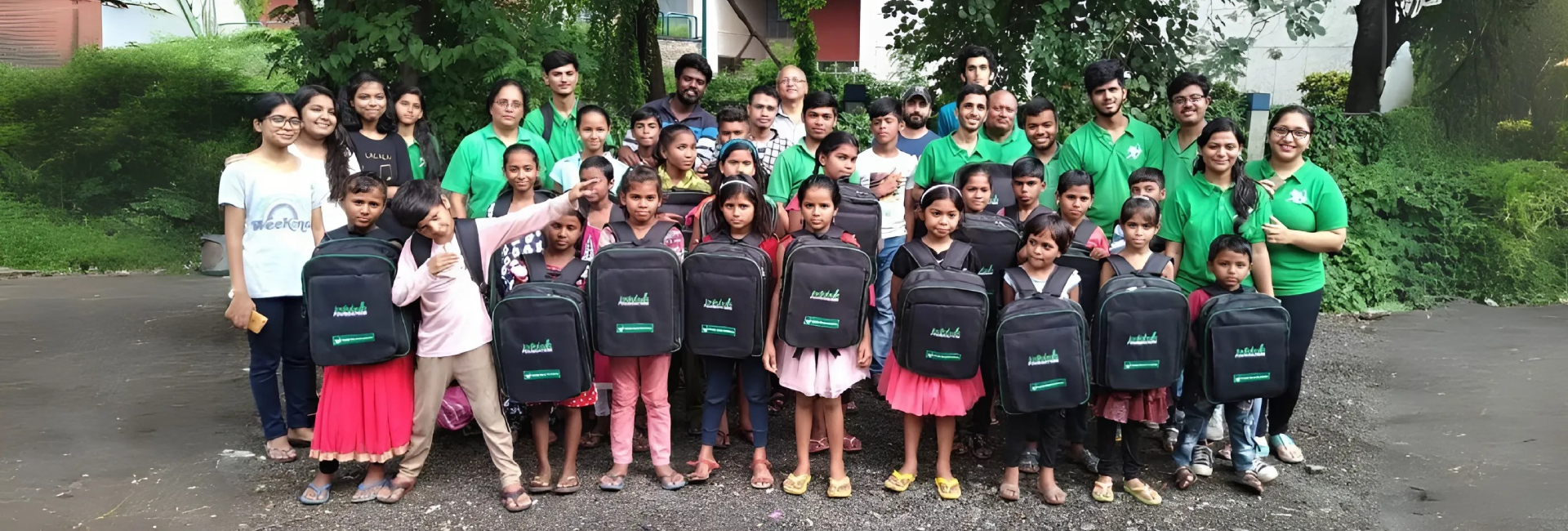(December 18, 2024) It was in 2022 a then 14-year-old Tejas Pugalia realised that countless students in rural India miss school during monsoons due to a lack of school bags to protect their books. This sudden awareness that the attendance rate dropped to 28 percent during raining season pushed the Nagpur lad to start Threads4Good, an initiative that transforms textile waste into durable school bags. In three years, Threads4Good has not only provided 3200 upcycled bags to the underserved kids but also upcycled 3,000 kgs of textile waste by employing marginalised people. A feat that has helped Tejas win the Diana Award 2024. “I’m delighted. Our months and months of hard work have been recognised,” he tells Global Indian.
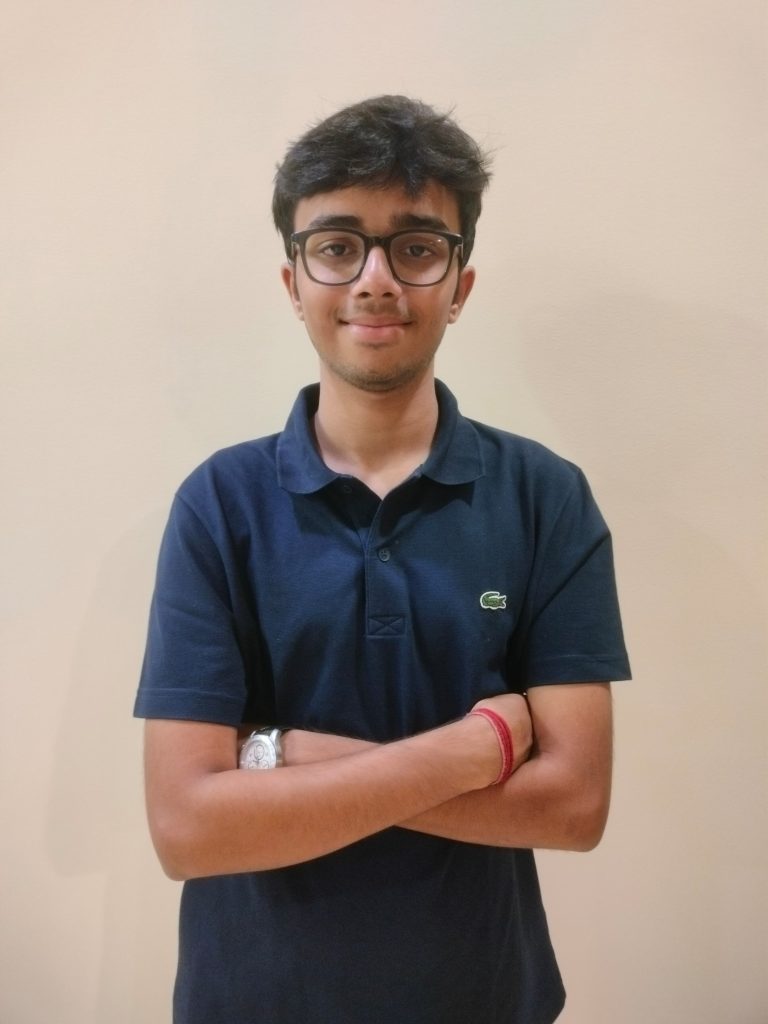
Tejas Pugalia
Each year, the Diana Awards, named after the late Princess of Wales – Diana, spotlight 200 young people across 45 countries who are making a difference. And this time, Tejas is among the 27 young Indians recognised for their impactful work. “It validates the work and is a testament to all the people who received the award that our work is creating an impact in the world. It motivates us to continue the work, not only for the recognition but also for the immense support we have found in the community,” adds the 17-year-old.
Like any regular day, Tejas Pugalia was neck-deep in studies when he received an email from his school teacher. A mere peek at the notification was enough for him to leave the class. The 12th grader had won the Diana Award 2024 for Threads4Good. “I was such an incredible moment,” he says, adding, “People are excited for the work that we do at Threads4Good and this in turn excites me.”
How an idea turned into purpose
It all began in the January of 2022 when the country was grappling with the third wave of Covid, and Tejas’s house help was in need of a tutor for her children. An academically-inclined Tejas jumped in to help. Those four months of tutoring made him aware of the many glaring problems that kids face in government schools. “The attendance rate in schools is very low during monsoons as most of the kids don’t have school bags, leading to the risk of books getting wet,” reveals Tejas, adding, “Staying back at home, they are often forced to take up some small daily work to earn money for the family.”
Initially Tejas Pugalia believed it to be one of case but soon realised it was a persistent problem across many government schools in India. “With the help of friends in different cities, we conducted a survey and found lack of school bags did lead to low attendance. The attendance which was 70 percent otherwise went down to 28 percent during monsoons.”
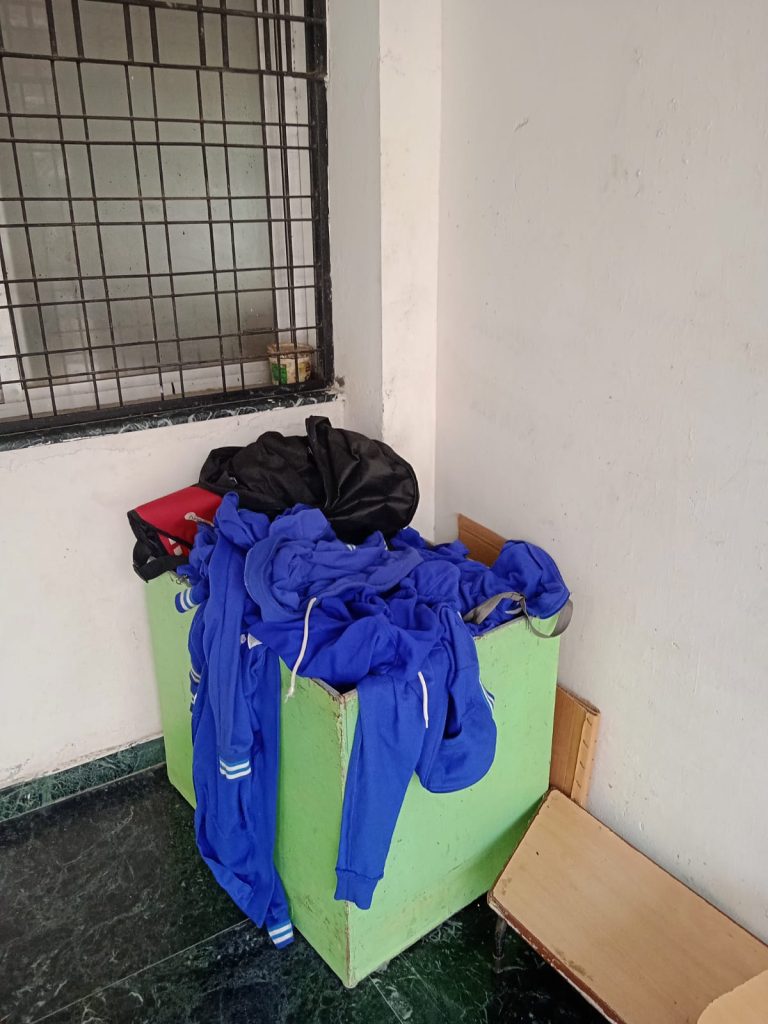

Textile Collection Drive
Keen to solve the widespread issue, Tejas decided to provide school bags but soon realised it wasn’t a viable option as they were expensive. That’s when a friend, Dhrishit Patel, mentioned that his father’s textile factory in Ahmedabad had thousands of tonnes of textile waste that could easily be repurposed to make bags. “That was our eureka moment.” Tejas saw an opportunity to make a difference by turning textile waste into school bags for underprivileged children and helping them continue their education. This led to the start of Threads4Good.
Multifold impact
“We partnered with a handful of textile factories and recycling and upcycling units in five cities to bring our mission to fruition,” says Tejas, who first began the textile waste collection drive in his school in Nagpur. “We organise it twice a month, inviting students to bring their old clothes or any textile items,” says Tejas, who holds similar drives in residential areas and high-rise societies.
“The textile waste is collected by upcycling units, who within a day or two, return with upcycled fabrics that’s used for making bags. However, Threads4Good aimed to create a deeper impact and began empowering marginalised individuals by providing them with employment opportunities. “It’s through NGOs or centre for marginalised people that we contacted them and taught them how to make bags.” Currently active in five cities – Nagpur, Kolkata, Ahmedabad, Hyderabad and Delhi/NCR, Threads4Good has employed 27 people. “They are mostly widowed women and specially-abled people. We are not only offering them a livelihood but a chance to live a dignified life. They are paid ₹60 per bag and each bag takes around 18 minutes to make.”
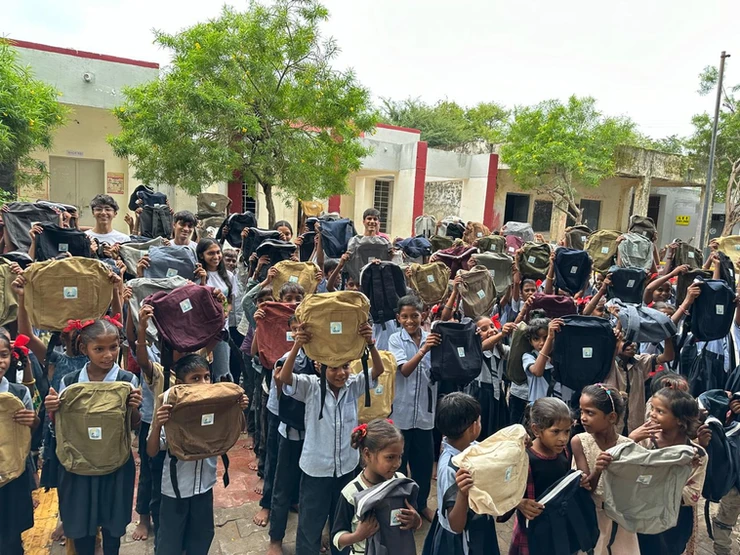

Threads4Good
Looking back, Tejas reflects on a key milestone for Threads4Good: reducing costs to reach more people. Initially, the high tailoring expenses posed a challenge, limiting their ability to expand. However, the decision to employ marginalised individuals turned this challenge into a solution. It not only lowered production costs but also gave these individuals financial independence and a renewed sense of dignity. “A lot of them couldn’t afford basic necessities, but now they are earning,” says Tejas. Alongside this, Threads4Good partnered with organisations like the Robinhood Army, whose volunteer network help identify children in need, collect textile waste, and ensure the timely delivery of school bags.
The army of volunteers
Collaboration has played a pivotal role in Threads4Good’s growth in five cities. Working with partners like the Robinhood Army has streamlined the process, making it more structured and time-efficient. “We have a 14-day cycle that starts with the delivery of recycled fabric and the making of bags and ends with the Robinhood Army identifying children and distributing the bags. Before these collaborations, the cycle took much longer,” explains Tejas, who works with an army of 320 volunteers. In Kolkata, Threads4Good has also partnered with an NGO that tutors underprivileged students. “They have valuable contacts and help us identify children who need school bags,” adds Tejas. These partnerships have not only reduced timelines but also brought a more organised approach to achieving Threads4Good’s mission.
Ask him about the funding, and the teen says that the initiative has received several grants and awards with cash prizes, all of which are used to support their mission. In Nagpur, a billionaire investor helps by paying ₹60 for each bag made in the city. “Threads4Good has also partnered with the CSR teams of major companies and is in the final stages of talks with TCS and a company in Kolkata. These collaborations are helping us continue and grow our efforts,” says Tejas.
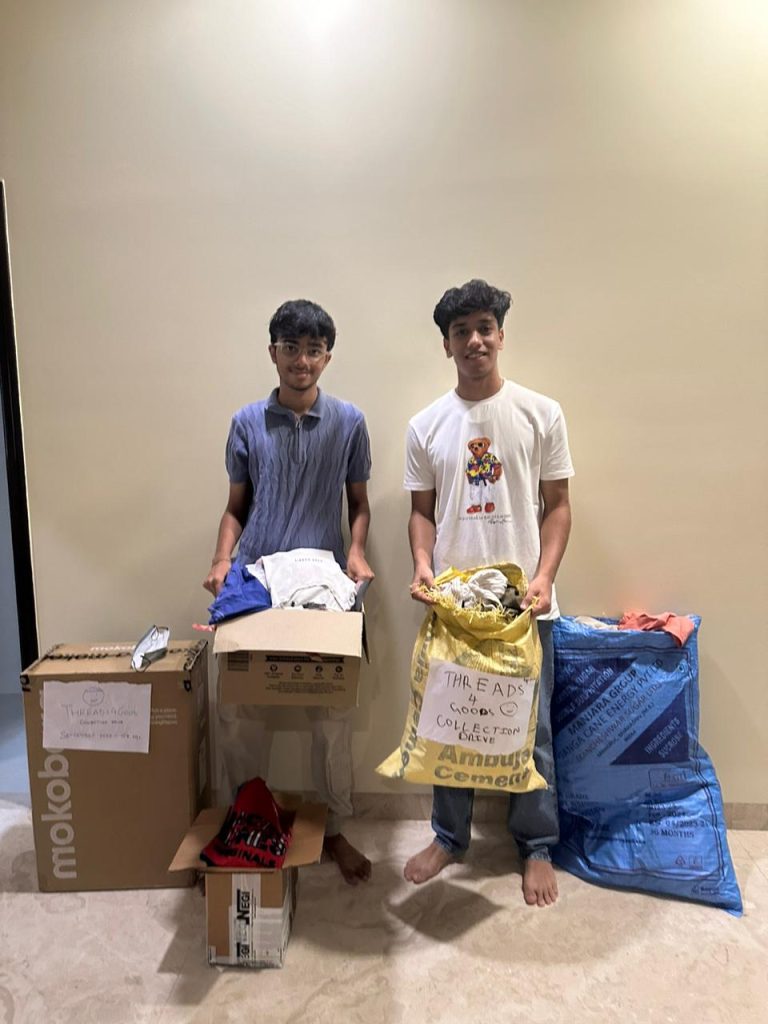

Saving carbon emission
Ever since its inception, Threads4Good’s impact has gone beyond empowering marginalised individuals and helping children access education — it’s also making a significant contribution to the environment. “I was shocked that it takes about 2700 litres of water to make one cotton t-shirt. Over the years, we have upcycled 3,000 kgs of textile waste and have saved around 88-90 million litres of water which would be polluted,” says a proud Tejas. Moreover, Threads4Good has kept textile waste out of landfills, preventing the release of harmful carbon emissions. “Textile waste in landfills is often burned, contributing to carbon pollution. By upcycling, we’ve prevented 60,000 kilograms of carbon emissions,” he adds.
Plans of expansion
Having created an impact, Threads4Good is now gearing up for its next phase of growth, with plans to expand to more cities across India and even beyond its borders to countries like Bangladesh and South Sudan. “We are in talks with embassies and local communities to help replicate the model in these countries,” shares Tejas. The mission remains the same: to support underserved children and ensure they have the resources to continue their education. “We are also focusing on creating sustainable and eco-friendly umbrellas.”
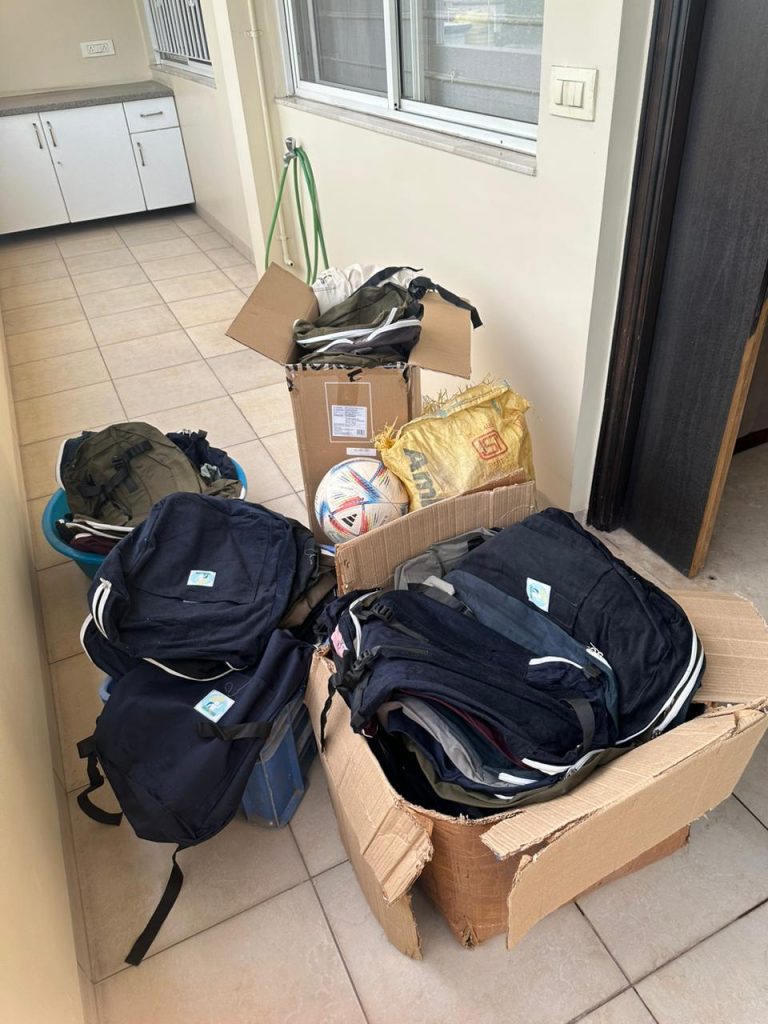

Threads4Good is also taking steps to address the systemic issues that prevent underserved children from getting an education. The team has filed a Public Interest Litigation (PIL) in the Supreme Court of India, highlighting the inadequate implementation of the Right to Education Act. “Article 21A of the Constitution requires government schools to monitor attendance and ensure students go to school, but that’s not being done,” says Tejas. The PIL also highlights the poor quality of mid-day meals in some schools. “Many times, the meals are so bad that they end up harming students instead of helping them,” he adds. Tejas hopes this effort will lead to better enforcement of laws and improved standards in schools, making the education system fairer while continuing its work on the ground.
Tejas Pugalia, a state-level football player who enjoys cooking to unwind, has simple advice for young people: observe the problems around you and think deeply before coming up with a plan to help. “A lot of kids ignore social injustices and choose not to react, but there are so many issues in India — both social and environmental — that need attention,” he says. For Tejas, change begins with awareness and the willingness to take small, meaningful steps to address these challenges.” Small, consistent efforts can lead to a significant impact,” he signs off.
- Follow Tejas Pugalia on LinkedIn

